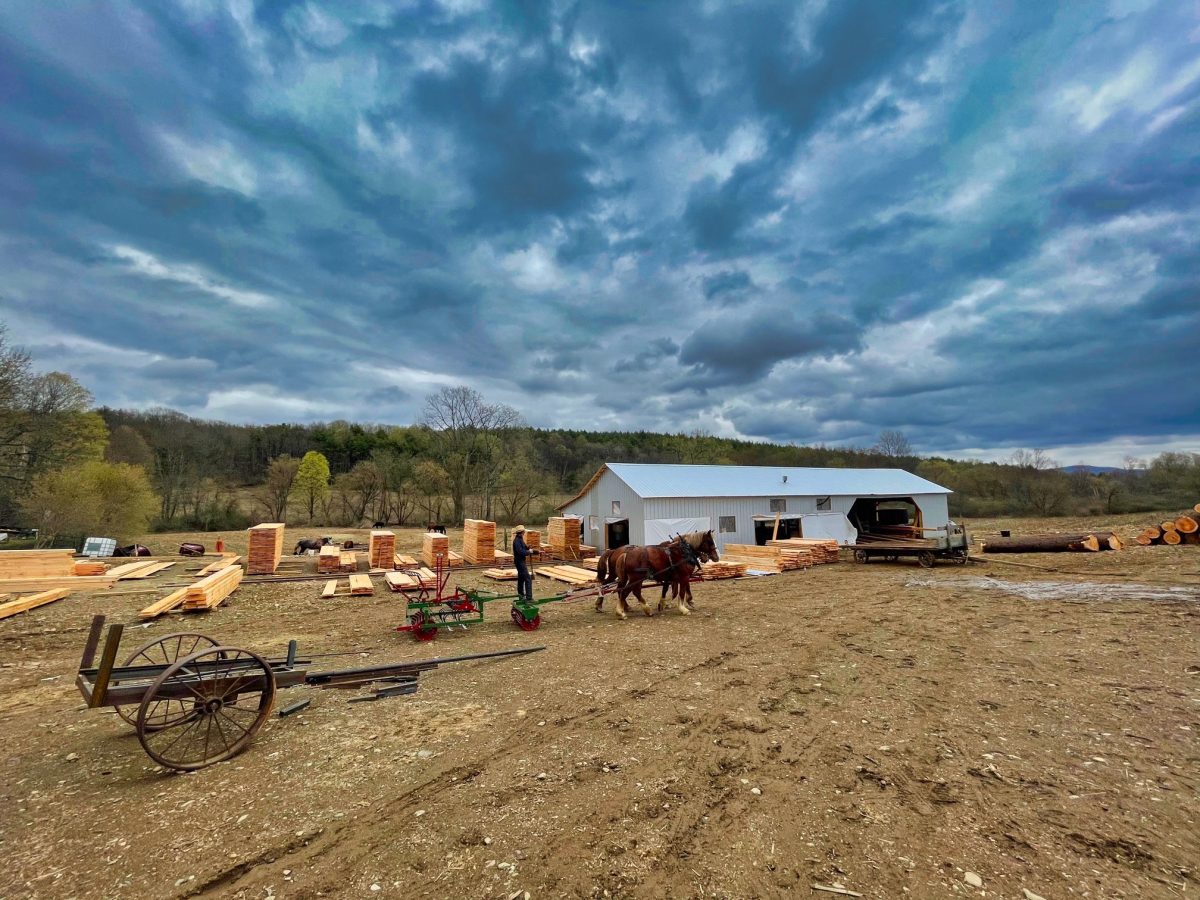When I visited the Miller farm yesterday to bring some blueberry bushes, the children were excited about a holiday they said was today.
I didn’t realize what it was until I went to buy a cookie this morning and saw that the stand was closed. Today is Ascension Day, an important day in the Christian and Amish calendar.
Known as Ascension Thursday, the holiday commemorates the Christian belief of the bodily Ascension of Jesus Christ into heaven.
Today, the Miller family withdrew into their community, praying, singing, worshiping Jesus Christ, the central figure in their faith and lives. Moise himself is off at a church gathering.
As I’ve often written, I am not a Christian, but I have followed Jesus Christ and his teachings – and emulated them when I could as best I could – for much of my life. There is nothing in his values I can’t abide.
It didn’t occur to me until I had known Moise and his Amish family for some weeks that this was one of the bonds we shared. Like the Amish, my values are often hidden from the world.
And Jesus is everything to them.
Christ shapes and defines almost everything the Old Amish do.
It has been painful for me to see the denigration of Christ’s teaching by people who claim to be Christians but who are relentlessly greedy, politically ambitious, cruel, and uncaring.
The people who speak Christ’s name the loudest seem to be the meanest.
In a limited way, Moise and his family have accomplished something I have only sporadically accomplished. They scrupulously follow Christ’s teachings.
I’ve learned in recent weeks that many people focus on the superficial aspects of Amish life – the puppy mills, the clothes, the horses and carts, the beards and quilts.
The deep and potent religious convictions that have enabled the Amish to survive for hundreds of years as a separate community are mostly hidden from public view and are rarely discussed by the outside world.
Amish don’t talk about Jesus on Sunday’s they live with him every day, all day, seven days a week. They don’t whine or complain about their hard lives, ever.
We “English” is a cynical and whiny lot.
Rep. Liz Cheney panicked and emptied half of the House of Representatives yesterday just by threatening to tell the truth. They couldn’t bear to hear it; they fled.
Among the cowards who rushed out of the chamber, much like the Transylvanians who flee Dracula in the night, were many Evangelical Christians who evoke Jesus Christ constantly but lie enthusiastically whenever it suits them in the polls.
Moise and his family do not lie.
Even when it suits them, this is shocking to me; it affects me deeply. I was beginning to believe that everybody lies. I guess that says something about our country in 2021. The truth is both dangerous and shocking.
But I am learning that it is possible to be a devout Christian and not be a hypocrite, coward, or liar. I’m certain there are many sincere Evangelical Christians. But many are robbing the Temple. We’d love to hear from the others.
I know the lessons the Amish are teaching their children. What, exactly are we teaching ours?
Amish spirituality is rooted in the teachings of Jesus, especially his Sermon on the Mount (Matthew 5-7). Amish worshippers use Martin Luther’s German translation of the Bible (1534) as one reason they cling to old and traditional ways.
They often explain what they are doing in this way:” that’s how we have always done it.”
Only New Testament texts are read in a church.
Matthew’s three chapters on the Sermon On The Mount receive by far the most attention in Amish services, reports Amish Scholar Donald B. Kraybill.
References to Jesus’s sermon amount to the closest thing to an Amish manifesto of faith and a guide to the Amish way.
One part of the Sermon (“Blessed Are The Meek”) emphasizes the importance of humility. That’s why Moise and his fellow Amish all dress alike; no one should stand out any more than anyone else. The Amish do not speak or laugh loudly. They do not argue or dominate conversations.
They don’t wear jewelry or listen to music or drive cars or defend themselves in lawsuits or speeches, or Op-ed pieces.
Christ’s call to be the “salt” and “light” in the world calls the Amish to practice their faith rather than seek converts or preach to non-Christians. They don’t want anything from us but to be left in peace and buy their donuts.
In the Sermon on the Mount, Jesus urged his followers to “judge not,” a further call for humility and self-reflection. The Amish do not judge or condemn other faiths, outsiders even people who have stolen from them or harmed them in violent ways.
At the end of his sermon, Jesus made it clear that his followers should live in a visibly and noticeably different way than other people because his followers should hold to a much higher standard of conduct.
This is the reason they dress and travel in ways that are noticeably different.
The standard Jesus set for Christians was simple – love and selflessness, help for the needy. This idea of selflessness became a core value of Christianity; it embodied Christ himself because his followers believed him to have died on the cross for the sins of others.
American politicians, by contrast, and many religious leaders, will lie their socks off for donations or a primary win and an endorsement by the planet’s biggest liar and hypocrite, our former President. Wow, Christianity has come a long, sorry way.
The Amish have often gone to jail rather than fight in wars, testify against criminals, or force their children into a public school that denies major tenets of their faith. They don’t have to argue much, if at all. The scriptures are pretty clear.
I spent some time on the phone last week with an Amish scholar who has been following my writings about the Amish on my blog.
“It would be inconceivable for an Amish person to seek political office or go to Congress,” he said.” They wouldn’t be able to lie. They couldn’t survive.”
That was a chilling and eerie comment for me to hear this week. It is clearly the truth.
I’m sure Moise would never dream of running for political office, but of course, he never could. He really can’t lie. I wonder, sometimes, if even my closest and oldest friends sometimes lie, as I have. I never wonder about Mosie lying.
I think that’s yet another grim commentary on us, even though we judge ourselves to be superior to the Amish in many ways.
Christ preached on the mount about subjects as diverse as prayer, justice, care of the needy, religious law, divorce, political dissent, challenging authority; he warned against judging other people in his sermon on the mount.
Amish faith requires members to obey the will of God and the teachings of Jesus. In this sense, their faith is much purer than most people who doubt or condemn them.
They live by the promise in Matthew 18:18-20 that whatever you decide on earth will bind you in heaven. God, they believe, is present whenever two or three people are gathered in God’s name.
Humility even shapes the Amish idea of salvation.
The Amish are decidedly non-emotional about their faith; there is no assurance of salvation. You don’t get in by confessing your sins.
The Amish speak of a “living hope,” an abiding belief that God, a fair and righteous judge, will grant eternal life to the faithful followers of Jesus.
They don’t ask or require the Evangelical language of having a “relationship with Jesus.”
For me, the heart of Amish spirituality – and the very thing that worries and troubles many “English,” especially feminists and feminist activists and progressives – is the yielding of oneself to a higher authority.
Domination by men has been a horror to many women and many children; it is a red flag to millions of people.
When the Amish talk about church, they talk about “giving themselves up” to church in the same way children and wives are supposed to yield to their fathers and husbands.
It’s not the American way or my way, but it is central to the Amish Way.
Curiously, it may be the very thing that has permitted the Amish to survive and prosper for five centuries, an almost unheard of accomplishment for a small and often isolated community that spurns technology and corporate greed.
All over the world, certainly in the United States, democracies are struggling to cope with the complexity of modern times – technology, climate change, globalism, immigration, China, Russia, North Korea, renegade dictatorships, violence, global economics, tribalism, and nativism.
When democracy is divided, it splinters into tribes and rebellious communities.
There is no single authority in most democracies that can make decisions, resolve conflicts, set an agenda. We can’t seem to resolve chronic poverty, gun violence, the ravages of trade agreements, a response to climate change, and the economic disparity that undermines democracy itself.
More and more people have turned to the Trump approach, which is to bypass democracy as unworkable or elitist and get their own agendas set without the difficulty of negotiation or majority rule. Democracy is slow, messy, and ugly.
Trumpism has no patience for it. The Amish do.
The problems in the Amish world are quickly and clearly resolved, not only because the men are completely in charge and must be obeyed, but because Biblical scripture is the final answer to every conflict in every situation – how they live, love, work, and marry.
Nothing goes unresolved for long. Leaders chosen by the community have tremendous power.
What an extraordinary irony to think that if Jesus came back again – scripture says he could – he would be most at home with the Amish. He supported the rights of women, but the Bible says clearly that men are in charge.
There is very little in the Amish world that would trouble or anger him. His famous sermon is read and followed daily. He would be at home.
They follow his teachings to the letter.
Yet as he looked out at the”English” world – the one that often suggests the Amish culture is too much of patriarchy, dominating, dog abusive, sexist and coercive, he would almost certainly view it the same way that he, a political radical, viewed the money lenders in the Temple.
It wouldn’t go well for our leaders, religious leaders, elected representatives, or bloated and obscenely rich CEOs if Jesus returned.
Our culture, which is in the midst of a civil war between Christian nationalists and the rest of the world, stands for everything Jesus hated and preached against.
It’s difficult for me to get my head around it.
My friend Mosie is a holy man in several ways – in his church, in his life. The Amish teachings of humility, peace, family, and community mirror my own beliefs about life as well as his.
I don’t want to have a dozen children, and my wife would throw me out of the house and beat me silly if I demanded obedience, but there is not much space between Mosie and me when all is said and done.
The Amish way of life is not an argument; it is not debated on cable news and political and legislative gatherings. There is one choice – get in or get out.
This, in theory, sounds like a dictatorship, yet somehow it isn’t.
There is no single cult or religious leader in the Amish Faith, no Trump or Popel or Mussolini.
The church is not centered away but is de-centralized in the homes and barns of its members, religious leadership in the hands of literally dozens of different communities, each one free to make day-to-day decisions about faith and religious justice.
The Amish idea completely rejects the Catholic idea of a Pope, the fascistic idea of a Great Leader, or the American ideal of a Trump. It is patriarchal yet oddly democratic at the same time. None of those people could ever rise to the top of the Amish world.
There is no just one way of being Amish but many. There is no question that the Amish faith is a patriarchy, just as the Bible ordered. Yet it is a soft one, say Amish historians and scholars.
There is room, writes author James A. Cates in Serpent In the Garden, a study of Amish sexuality, for individual thought, creativity, and expression inside the Amish moral order.
“Amish society does not exercise authoritarian control or relegate members to blind obedience,” writes Cates, who grew up in the faith.
“There is leeway for unique choices,” he says. “There is the very fact that these are flexible boundaries that contributes to the conflicts and limit setting in which the church routinely engages.”
Yet, we stubbornly consider ourselves much more democratic than them.
These days, I feel at odds with so much of the so-called “Christian” world around me, with the smug lives of the “English.” I guess I’m more at ease with Moise than us when all is said and done.
Our social scientists have always been obsessed with the connections and context between society and religion.
Every religion is set around a particular social system; the Amish faith is no different, except that theirs works and most don’t.
The themes of humility, obedience, patience, and acceptance fit easily into the structure of a small community that insists its members sacrifice their own well-being for the good of the community.
That is the complete opposite of the American experience, especially in recent years. We value the individual over the community, ideology over the community; the truth is blown off as easily as leaves in Autumn – consider the Liz Cheney outrage.
We value money, power, and domination, not humility and selfishness. We are a so-called Christian nation that is abandoning true Christianity.
We change the truth as easily as we change our underpants.
No wonder the Amish are greeted with suspicion and cynicism.
What is so interesting to me is that the spiritual ideas of the “English” are losing their credibility.
In contrast, the spiritual ideas of the Amish have never been stronger or followed more faithfully. There is definitely something there for us to learn.
I’m on it. Thanks for reading.





